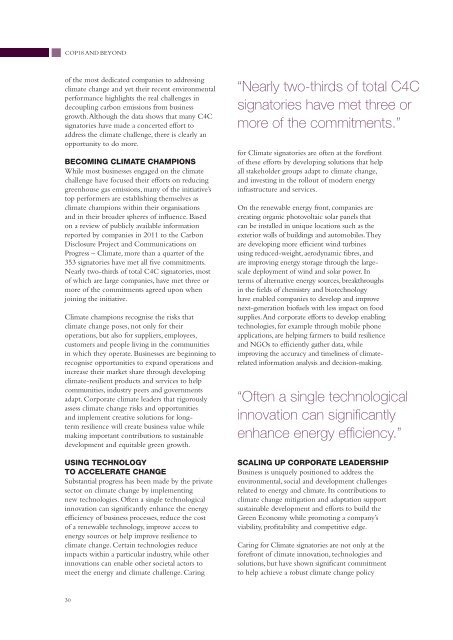Climate Action 2012-2013
Create successful ePaper yourself
Turn your PDF publications into a flip-book with our unique Google optimized e-Paper software.
COP18 AND BEYOND<br />
of the most dedicated companies to addressing<br />
climate change and yet their recent environmental<br />
performance highlights the real challenges in<br />
decoupling carbon emissions from business<br />
growth. Although the data shows that many C4C<br />
signatories have made a concerted effort to<br />
address the climate challenge, there is clearly an<br />
opportunity to do more.<br />
BECOMING CLIMATE CHAMPIONS<br />
While most businesses engaged on the climate<br />
challenge have focused their efforts on reducing<br />
greenhouse gas emissions, many of the initiative’s<br />
top performers are establishing themselves as<br />
climate champions within their organisations<br />
and in their broader spheres of influence. Based<br />
on a review of publicly available information<br />
reported by companies in 2011 to the Carbon<br />
Disclosure Project and Communications on<br />
Progress – <strong>Climate</strong>, more than a quarter of the<br />
353 signatories have met all five commitments.<br />
Nearly two-thirds of total C4C signatories, most<br />
of which are large companies, have met three or<br />
more of the commitments agreed upon when<br />
joining the initiative.<br />
<strong>Climate</strong> champions recognise the risks that<br />
climate change poses, not only for their<br />
operations, but also for suppliers, employees,<br />
customers and people living in the communities<br />
in which they operate. Businesses are beginning to<br />
recognise opportunities to expand operations and<br />
increase their market share through developing<br />
climate-resilient products and services to help<br />
communities, industry peers and governments<br />
adapt. Corporate climate leaders that rigorously<br />
assess climate change risks and opportunities<br />
and implement creative solutions for longterm<br />
resilience will create business value while<br />
making important contributions to sustainable<br />
development and equitable green growth.<br />
USING TECHNOLOGY<br />
TO ACCELERATE CHANGE<br />
Substantial progress has been made by the private<br />
sector on climate change by implementing<br />
new technologies. Often a single technological<br />
innovation can significantly enhance the energy<br />
efficiency of business processes, reduce the cost<br />
of a renewable technology, improve access to<br />
energy sources or help improve resilience to<br />
climate change. Certain technologies reduce<br />
impacts within a particular industry, while other<br />
innovations can enable other societal actors to<br />
meet the energy and climate challenge. Caring<br />
“Nearly two-thirds of total C4C<br />
signatories have met three or<br />
more of the commitments.”<br />
for <strong>Climate</strong> signatories are often at the forefront<br />
of these efforts by developing solutions that help<br />
all stakeholder groups adapt to climate change,<br />
and investing in the rollout of modern energy<br />
infrastructure and services.<br />
On the renewable energy front, companies are<br />
creating organic photovoltaic solar panels that<br />
can be installed in unique locations such as the<br />
exterior walls of buildings and automobiles. They<br />
are developing more efficient wind turbines<br />
using reduced-weight, aerodynamic fibres, and<br />
are improving energy storage through the largescale<br />
deployment of wind and solar power. In<br />
terms of alternative energy sources, breakthroughs<br />
in the fields of chemistry and biotechnology<br />
have enabled companies to develop and improve<br />
next-generation biofuels with less impact on food<br />
supplies. And corporate efforts to develop enabling<br />
technologies, for example through mobile phone<br />
applications, are helping farmers to build resilience<br />
and NGOs to efficiently gather data, while<br />
improving the accuracy and timeliness of climaterelated<br />
information analysis and decision-making.<br />
“Often a single technological<br />
innovation can significantly<br />
enhance energy efficiency.”<br />
SCALING UP CORPORATE LEADERSHIP<br />
Business is uniquely positioned to address the<br />
environmental, social and development challenges<br />
related to energy and climate. Its contributions to<br />
climate change mitigation and adaptation support<br />
sustainable development and efforts to build the<br />
Green Economy while promoting a company’s<br />
viability, profitability and competitive edge.<br />
Caring for <strong>Climate</strong> signatories are not only at the<br />
forefront of climate innovation, technologies and<br />
solutions, but have shown significant commitment<br />
to help achieve a robust climate change policy<br />
30












